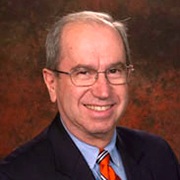
Robert J. Steigmann
Robert J. Steigmann received two degrees from the University of Illinois at Urbana-Champaign, a B.S. in 1965, and a J.D. in 1968. From 1968 to 1969, he was a staff attorney with the Illinois Legislative Reference Bureau, the bill drafting agency of the Illinois General Assembly. From May 1969 to June 1971, he served as an Assistant State’s Attorney in Sangamon County (Springfield), Illinois, and from June 1971 to December 1976, he served as an Assistant State’s Attorney in Champaign County (Urbana).
In 1976, Judge Steigmann was elected circuit judge for the Sixth Judicial Circuit. As a circuit judge, he spent the great majority of his time holding court in Champaign County, where his caseload consisted primarily of felony and juvenile delinquency cases. In July 1989, the Illinois Supreme Court assigned Judge Steigmann to serve as a justice on the Fourth District Appellate Court. In November 1994, Judge Steigmann was elected to that court and was retained for 10-year terms in 2004 and 2014.
Judge Steigmann has been a frequent lecturer and writer on the subjects of criminal law, criminal procedure, juvenile law, and the rules of evidence. He co-authored Illinois Evidentiary Foundations (2d ed.) (Michie 1997) and the three-volume treatise, Illinois Evidence Manual (4th ed.) (West Group 2006), which he updates annually. He served four years (1992-96) as Chairman of the Illinois Supreme Court Committee on Pattern Jury Instructions in Criminal Cases. He also serves as an adjunct faculty member at the University of Illinois College of Law, teaching Illinois evidence and civil procedure. From 1997 through 1999, he served as a faculty member of the New York University Law School Institute of Judicial Administration, making presentations to new judges on courts of review.
The Association of Government Attorneys in Capital Litigation (the national death penalty prosecutors’ association) has twice asked Judge Steigmann to address its national convention (1999 in Chicago and 2000 in Denver) about how prosecutors should make and protect the trial court record in capital cases.

- No sessions found.